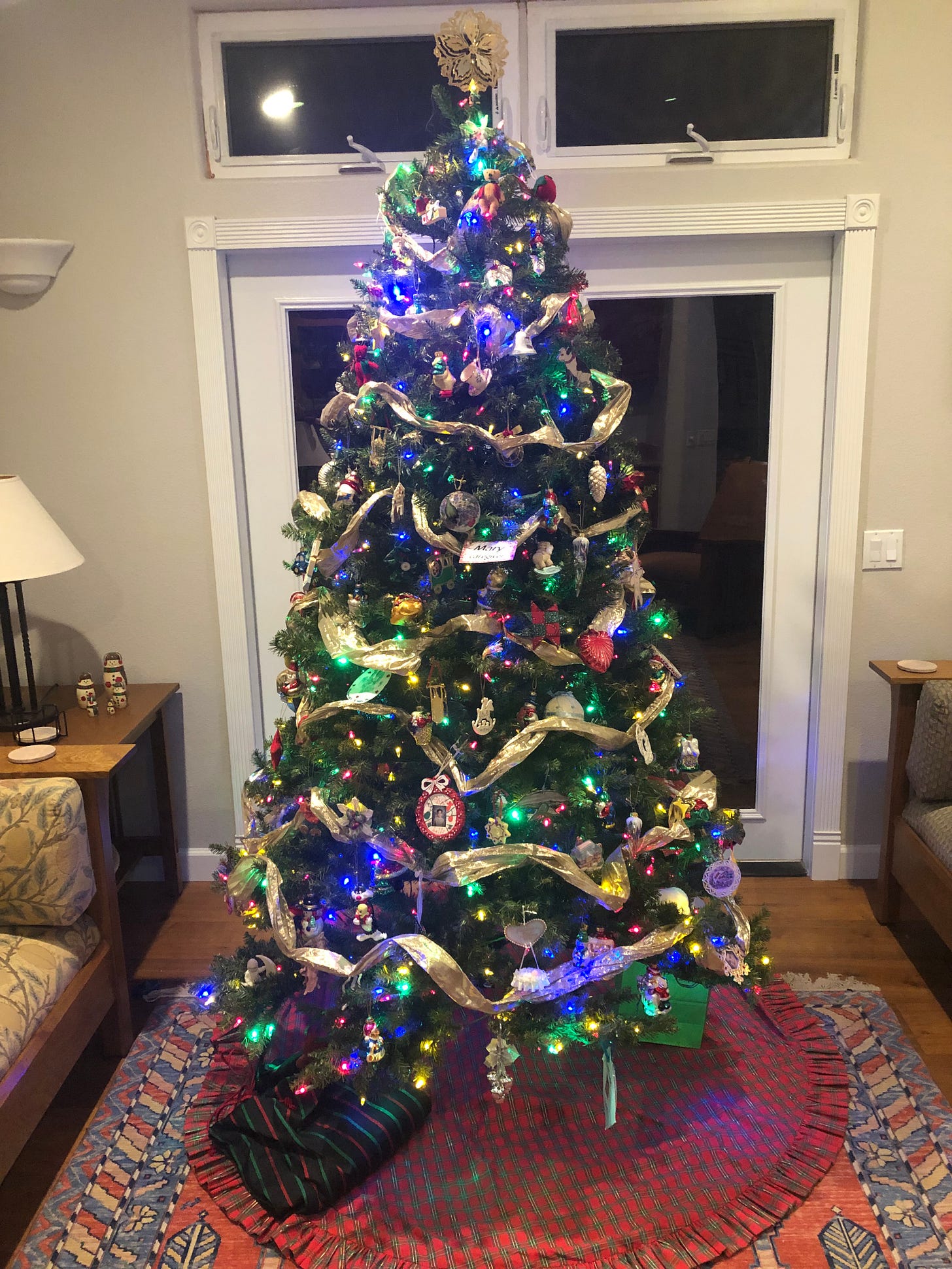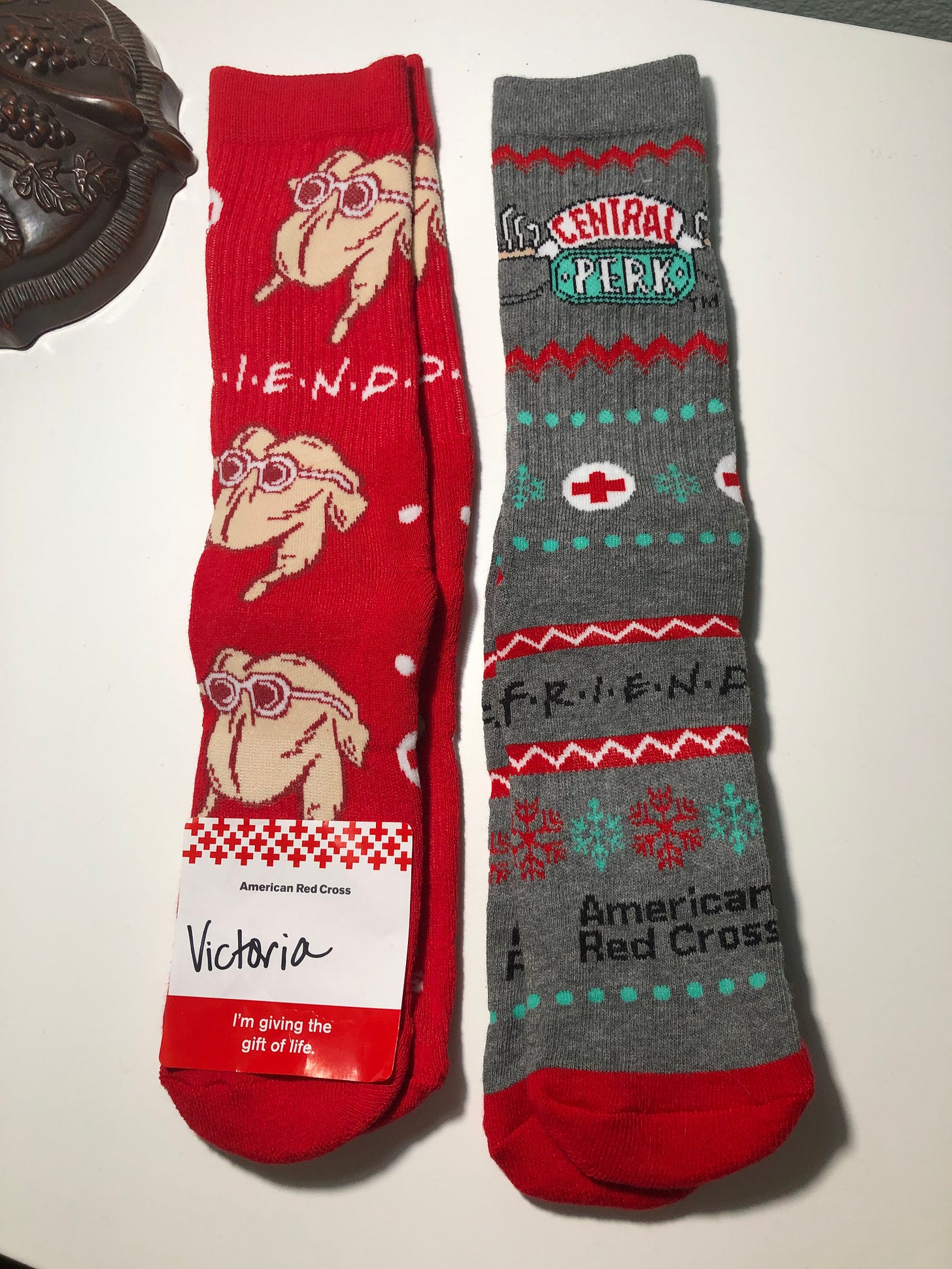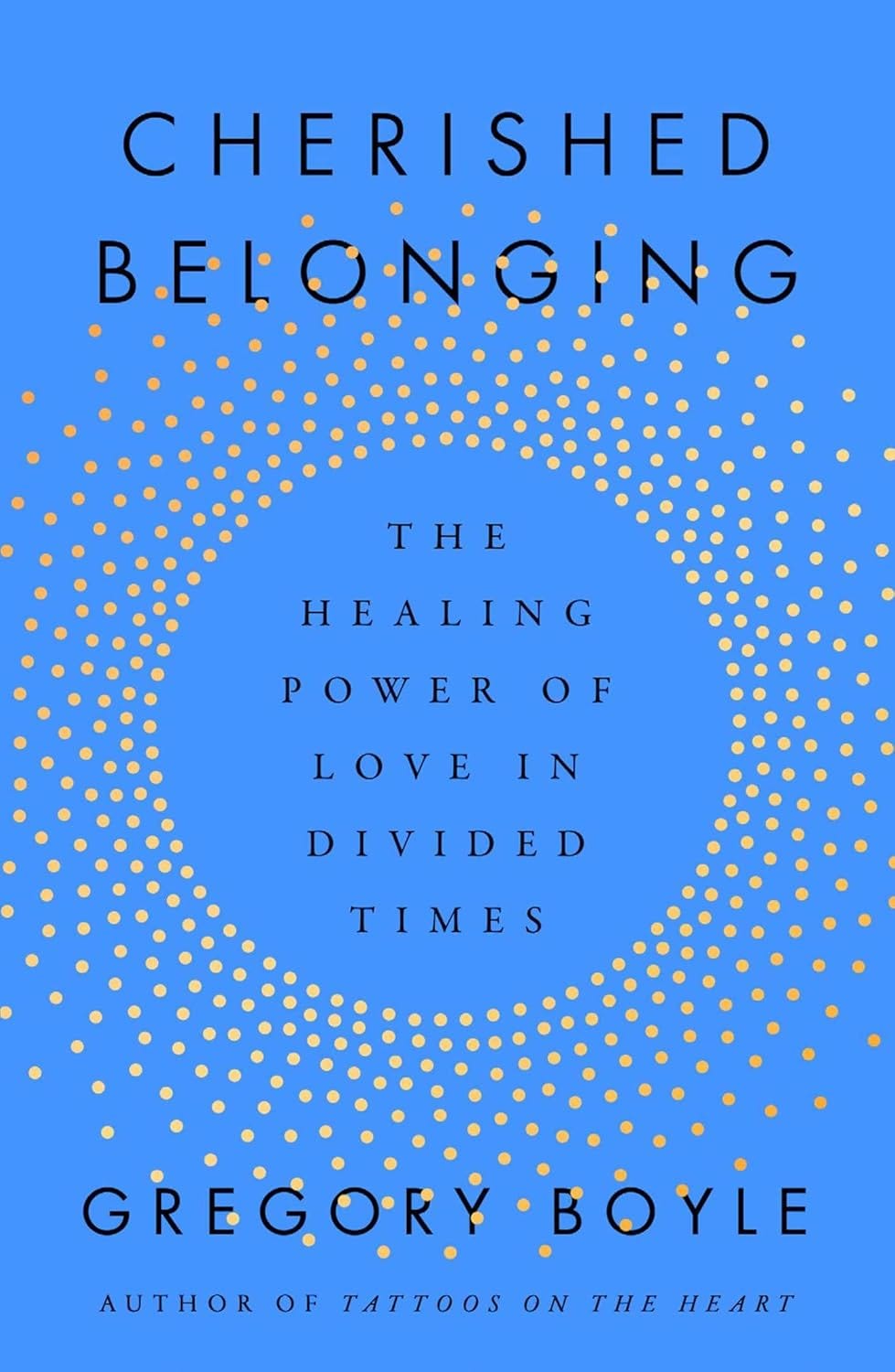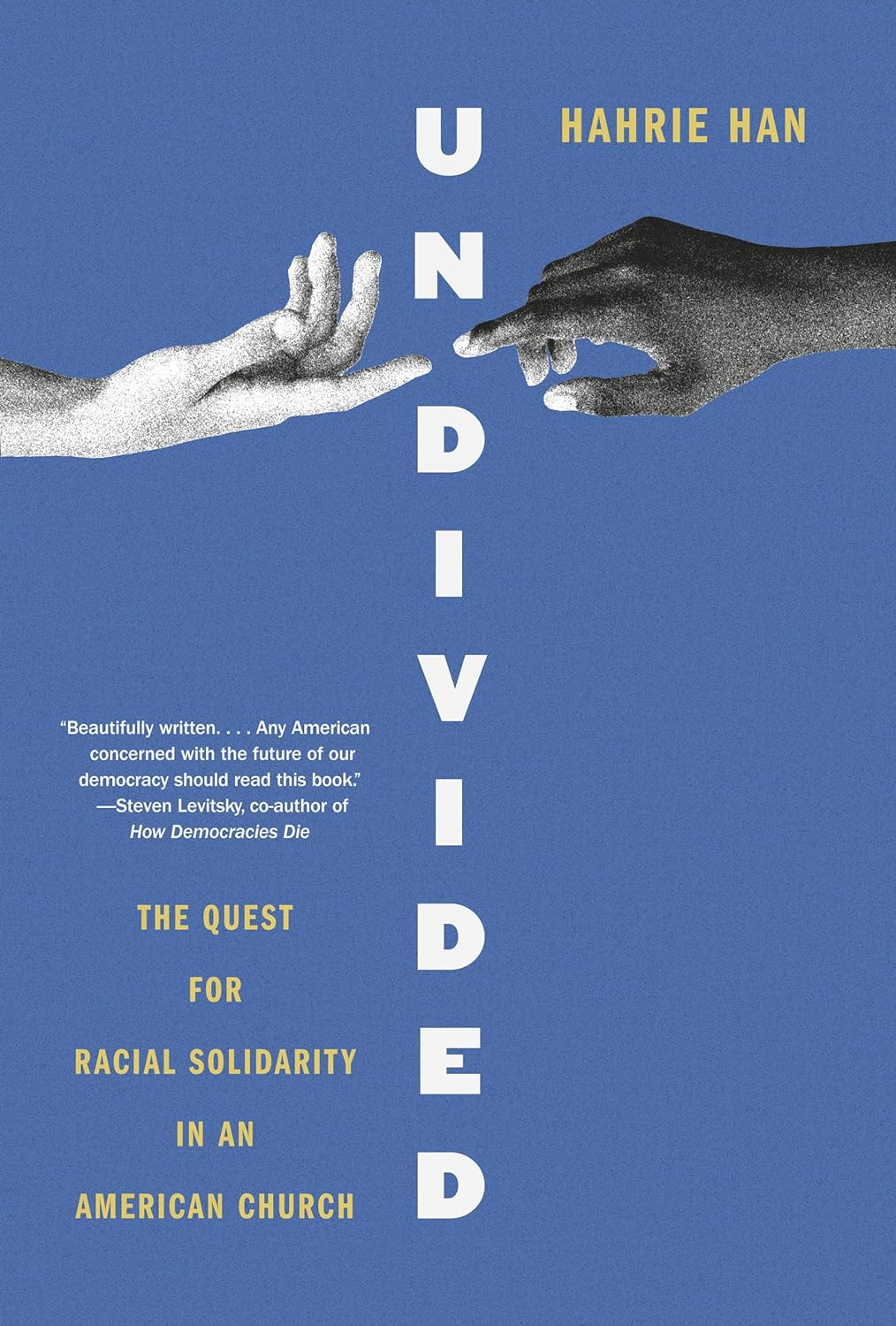Undivided, Cherished Belonging
“Mankind was my business!” The spirit of Christmas: books celebrating love and connection

Hi Friends,
I see that Hanukkah begins on Christmas Day and this has led me to wonder about whether movie theater ticket sales on December 25 will significantly drop. I’m thinking about pointless stuff because it’s Friday as I work on this Sunday post, and I want my mind off the drama of a possible government shutdown. [I thought I typed ‘shutdown,’ but that autocorrected to ‘shit down’—I’ll just leave that there.] I don’t want to think of an unelected shadow president. Not at least until after the new year.
I mentioned previously that I understand why people who have had traumatic spiritual experiences have become atheists. This is not a thing I worry about because I don’t believe in a hell or any sort or eternal punishment (I don’t believe in reincarnation until we get it right, etc.). But I also know people who want to be empowered by taking back their spiritual lives and beliefs from the abusers. And since this is the week of Christmas, I want to share two books about people whose faith is centered in love and reconciliation. Today, I finished reading one and listening to the other. They reminded me of Charles Dickens’s A Christmas Carol when the ghost of Marley admonishes Scrooge: “Mankind was my business!”
Cherished Belonging
A bit of background on Gregory Boyle and Tattoos on the Heart:
Father Gregory Boyle is the Los Angeles Jesuit priest who founded Homeboy Industries and Homegirl Café. He received the Medal of Freedom this year. He has also received the California Peace Prize and been inducted into the California Hall of Fame. Back in 2010, I was so taken by his first book, Tattoos on the Heart, that I bought copies for my relatives for Christmas and wrote this review:
Their motto: Nothing stops a bullet like a job.
Father Boyle—“G-dog” as he is known by his homies—acts in a way that is very much centered in his faith (Catholicism) as a Christian, but is also so unusual that his story makes a startling read. And here’s why: he believes that every individual has equal value in society. And unlike most of us, he doesn’t just say it. He truly believes it. For Father Greg, there are no throw-away people. He never stops caring—and so the subtitle of this book—The Power of Boundless Compassion—is apt. When I say that his compassion is amazing, I know that the word ‘amazing’ is so overused that you may not understand what I mean. But I think it is the right word—I’m filled with wonder at the life of this man.
Father Greg’s stories of gang bangers leaves us to wonder—Am I really a good person or have I just been sheltered from the things that would make me bad? When you read what many of the ‘homies’ in this book have gone through, you’ll wonder how they ever made it out to a normal, productive life. And you will wonder at the life of ‘G-dog’—who, in the twenty-five or so years that he has been working with LA gang members, has helped so many out of the gang life only to bury them later, when they are shot in drive-bys or targeted. Father Greg has buried almost 200 gang or former gang members.1 And yet, he keeps the faith.
Father Greg tells the reader that centering one’s life on love will get a person through the worst. Gangsters often tell him that they don’t want people to ‘mistake their kindness for weakness.’ But as Boyle shows, “sooner or later, we all discover that kindness is the only strength there is.”
Even with boundless love, a person needs a real sense of humor to find joy in this life, and Father Greg has it. Many of his anecdotes about dealing with young men and women are really funny. My favorite is when he writes about gangsters reading aloud and replacing words they don’t know with words they do. Thus in Bible passages referring to the ‘Gentiles,’ they use the word ‘genitals.’ Father Greg says this really livens up the public readings!
Yes, you will laugh—and you’ll cry, quite a bit. But do read this book. It will remind you that saints have a beginning as real human being.

The Healing Power of Love in Divided Times
Cherished Belonging is Father Greg’s fourth book. Again, he looks at how love (“Cherishing is love fully engaged. Cherishing is tenderness in action.”) is our job, how it is active, and how it resolves troubles. And again, I am amazed at his capacity for cherishing, his ability to walk the walk of genuine Christian calling. What I mean is that I only dream of being so fully accepting of others. Like many people, I’ve sometimes felt that unconditional love is beyond human capacity. But no—Father Greg’s life and work disprove that. He doesn’t see anyone as ‘the other’ and everyone involved in Homeboy Industries learns that lesson. Former gang rivals who once might have wanted to shoot one another on the street now work side by side.
If it feels like people in the U.S. have forgotten the roots of Christianity, Father Greg’s worldview is an antidote for the Christian nationalism blues. This also means that many purported people of faith will not agree with the “two unwavering principles” of Homeboy Industries:
Everyone is unshakably good (no exceptions)
We belong to each other (no exceptions)
He repeatedly makes the point that God’s power lies not in rescuing us, but in loving us. While he refers to Jesus often, he also sometimes uses the pronoun ‘She’ in reference to God and chides the Church for continuing “to prevent women from full inclusion.” He seems to have no concern with upsetting religious literalists:
At a house where I was leading a weekend retreat, the first reading was a story of Abraham and Isaac. It begins, “God put Abraham to the test.” I opened my homily by telling the congregation that life provides us with endless “tests,” but not once has the God of love ever thrown one our way. Not ever. “And besides,” I told them, “any father who hears God tell him to kill his son is mentally ill.” They applauded, which surprised me. I proceeded, then, to preach on the transfiguration.
If conservatives really want to feel outrage, they will find their dose in reading about Father Greg’s defense of the Sisters of Perpetual Indulgence—all gay men who sometimes dress in “mock wimples worn by nuns in 1954”—for their “considerable service and charitable works.”
Boyle’s God is the God of second chances (and third and fourth…). Reading about his metaphysics made me think of the idea of ‘turning the other cheek’—that this might not mean what I’ve always thought it meant (be a punching bag) but rather is just another way of saying forgive seven x seventy times. But there is an important progress to this that doesn’t include allowing people to take advantage of others. For example, at Homeboy, if people test positive for drugs or have other relapses, they are sent out and told, “Come back to us when you’re ready [sober, etc.].” This understanding of human relationships extends to all people. Of Donald Trump, Father Greg says that no mentally well person would be that malignant narcissist and sociopath, so we have to feel for him in his mental illness. But he also notes that a person that ill should not be handed the Presidency of the United States. (Oops!)
Father Greg’s writing style is epigrammatic. It reminds me of Ralph Waldo Emerson in that you can pull quotes, sentences from within the same paragraph, that encapsulate different ideas. (“People don’t become homeless because they run out of money…They become homeless because they run out of relationships.”) As in past books, Father Greg tells anecdotes about the former gang members who have been helped at Homeboy. There are some “I’m not crying, you’re crying” moments once again, but there are some laugh out loud stories as well. When Father Greg went to Washington D.C. to receive the Medal of Freedom this year:
A homie sends me a congratulatory text: “I heard you got a presidential pardon … or some shit like that.” A home girl, Ivy, stands in for me at a luncheon talk at which she says, “Father Greg couldn’t be here today because he’s at the White House being knighted.”
If you love language,2 you’ll enjoy some of the words Homeboy workers make up to suit the circumstance. A few favorites:
”I feel belongance.”
When Steve Avalon’s encounters a homie who manipulates, he calls him a “shenanigizer.”
Undivided
I listened to Undivided: The Quest for Racial Solidarity in an American Church by Hahrie Han. If you read my earlier post about the book Circle of Hope, you know that I was wondering if a church that engages in work to bridge racial divides—one that openly discusses racism and the question of how the church can make racial equality part of their mission—can survive. The Circle of Hope did not. Though leaders came apart over their differences, they continued to do good work elsewhere.
I was intrigued by the publisher’s blurb that suggested the megachurch Crossroads had succeeded in combating racial injustice and managed to hold together.
Crossroads is a racially mixed but majority white evangelical megachurch in Cincinnati. In 2016, it was a critical force in helping to pass a ballot initiative for universal preschool, providing early childhood education for the poorest, mostly Black, constituents. Author and political scientist Hahrie Han investigates how this happened in an area that voted for Donald Trump in 2016.
Han finds that Crossroads Pastor Chuck Mingo begins the work of combating racial injustice through the church after he feels called by God to do so and gives an honest sermon about his own experience with racism (he’s Black)—experience that most of the white parishioners don’t comprehend. Congregants then have the opportunity to participate in a faith-based program designed to foster anti-racism and systemic change called Undivided. They look at their own prejudices, but also—importantly, vitally—beyond them to understand systems of oppression.
Just as in Circle of Hope, Undivided focuses on four participants—two men, one Black and one white, and two women, one Black and one white. They are all changed at the core through the program. While they don’t all stay in the church itself, the church is huge and survives. What they learn is very powerful. It made me think: Crossroads’ success with their anti-racism program is due not only to the goodwill of the Undivided participants—Circle of Hope had people of goodwill in their anti-racism efforts—but to their curriculum. I know this makes me sound like the teacher that I am, but as you read the book, you’ll find that it’s true. Curriculum matters.
Since I listened to the audiobook, I’ll add that the narration is very good.
More books I’m glad I read this year
I don’t have a list of ‘best books’ of the year because, as a librarian, I think more about books serving needs than being in a contest. Nevertheless, some of my favorites this year were also on lists of literary greats and won prestigious awards.
Fiction
James by Percival Everett
Winner of the National Book Award. I mentioned previously that beside the fact that this is a beautiful piece of writing and a meditation on race in America, it corrects the last one-third of Huck Finn, the section of the novel that fell apart and always made me crazy.
American Spirits by Russell Banks
These three long stories were timely—people’s lives in the era of Trump—but so dark that I had to put it down a few times (hostile, violent, tragic, and lost people in the fictional town of Sam Bent). Banks’s writing is brilliant. He died in early 2023; American Spirits is his final publication (2024).
Small Things Like These by Claire Keegan
Shortlisted for the Booker Prize. Taking place in Ireland, this little novella shows the dark side of Catholicism. It’s fiction based on the historically real Magdalene Laundries, run by Catholic nuns with the labor of unwed mothers, whose babies were sold out to adoption. It’s centered on the abuses that occur in a particular convent and deals with the difficulties and dangers of doing the right thing. Such powerful writing. This is a ‘can’t put it down’ for readers and a lesson in mastery for writers.
Nonfiction
Knife by Salman Rushdie
While I knew that Rushdie almost died in a knife attack in 2022, I didn’t realize how numerous and serious his injuries were. A great number of people came to his aid, both during the attack and through his long recovery. As nonfiction, the style departs from that of his works of fantasy and magic.
That Librarian by Amanda Jones
I hope to review this in the near future. For now: Jones, quite civilly, speaks up against book banning at a local public library hearing and is ostracized and threatened with her life. The part that was most shocking to me was how, in a town she had lived in all her life, fair weather friends turned against her, attacking her character.
Sexism & Sensibility: Raising Empowered, Resilient Girls in the Modern World by
I also hope to review this in the near future. For now: This is a discussion of the effects of sexism on girls and ways to help them fight back while maintaining their self-esteem. A great book for libraries, including high school libraries.
Top 10 checkouts for the New York Public Library in 2024
I found this list on Ron Charles’s (Washington Post) Book Club newsletter this week. I thought it was a fun deviation from the usual top ten of the year list. Charles noted that none of these are new books.
Tomorrow, and Tomorrow, and Tomorrow by Gabrielle Zevin
Happy Place by Emily Henry
Fourth Wing by Rebecca Yarros
The Heaven & Earth Grocery Store by James McBride
Demon Copperhead by Barbara Kingsolver
Lessons in Chemistry by Bonnie Garmus
Hello Beautiful by Ann Napolitano
Remarkably Bright Creatures by Shelby Van Pelt
Yellowface by R.F. Kuang
The Covenant of Water by Abraham Verghese
Of the ten, I have read six:
Tomorrow, and Tomorrow, and Tomorrow
The Heaven & Earth Grocery Store
Demon Copperhead
Lessons in Chemistry
Hello Beautiful
Remarkably Bright Creatures
I loved the first three. The second three, not so much (not for me).
Part 2
While there is lots of book ban news, I decided to forgo it this week and stick with the positive holiday cheer of good books.
I need to take a break and work on a few other things, so there won’t be any news from me next Sunday. But, God willing and the creek don’t rise, I’ll be back in the new year.
I wish you happy and peaceful holidays.
In Cherished Belonging, fourteen years later, Boyle tells the story of burying the 261 person who died of gang violence, so this number is still climbing.
Literary folks, you’ll like this: in listing his beliefs, Boyle quotes George Saunders: “Kindness is the only non-delusional response to everything.”






Yes to books meeting a need! I so appreciate these recommendations and am honored to see Sexism & Sensibility here! Excited that you might review it!!! Merry Christmas Victoria ❤️
I like your comment about books serving a need, not being in a contest with each other. Thanks for sharing these books that nudge us toward kindness and love.